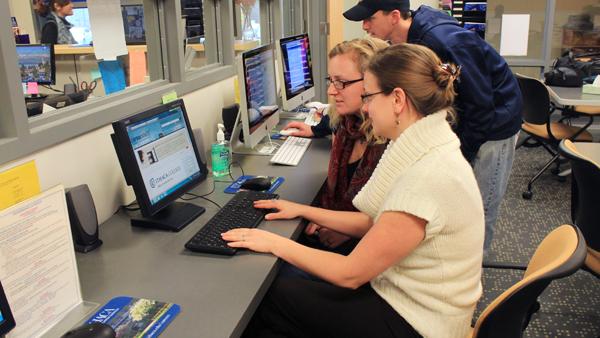As the semester winds down, students are beginning to search for spring and summer internship possibilities, and for some the difference between internships requiring credit or not may be a deciding factor.
Ithaca College offers students many resources to aid the internship search process. Generally students find in their search that employers require college credit. While many students believe credit is mandatory, legally it’s not.
The college does not place restrictions on non-credit internships but is not formally involved with them. But when students do take internships for credit, each school has different requirements. Students in the communications school are required to complete 60 on-site hours per credit, and students in the School of Business must complete 55 on-site and five course-work hours per credit.
In addition to these requirements, students must also pay for internship credits. If students have internships during the academic year, any credits will be covered by their tuition. Students that do internships during the summer must pay $1,058 per credit.
According to the Department of Labor, the Fair Labor Standards Act of 1938 lays out specific guidelines for unpaid interns. Interns do not need to receive payment as long as they are benefiting from their experience. If an intern’s experience mirrors training, and they do not replace a paid employee, then the employer does not need to pay them.
While it is not required, by offering academic credit businesses help ensure that the internship will count as an educational experience for interns.
In an average year, about 200 health science and human performance students, 175 business students and 350 Roy H. Park School of Communications students complete internships or fieldwork.
The internship data from the School of Music and the School of Humanities and Sciences is not available.
Ross Perlin, author of the book “Intern Nation: How to Earn Nothing and Learn Little in the Brave New Economy,” said many employers require students to receive credit to protect themselves legally from the Department of Labor.
“There’s a kind of myth that academic credit can substitute for pay, and some employers see it as a way to potentially get around paying their interns,” Perlin said. “Even if they don’t think it makes it entirely legal, they at least want to cover their bases as much as possible.”
Another incentive for employers to require college credit is liability insurance. Jennifer Halperin, internship coordinator at Columbia College of Chicago, said if an intern is receiving credit, then their school holds the liability.
“It comes down to a question of whether a student would be covered under the school’s insurance or the supervisor’s insurance,” Halperin said. “If the student is getting credit, then there is an assumption that the school will carry the insurance on the student.”
Perlin said it has not been established who carries the liability of interns, but schools are typically held responsible.
“One motive that employers have is to push potential liability onto the schools,” Perlin said. “Academic credit would potentially lead a court to assume that the responsibility lies with the school, not with the employer.”
Jessie Stone He, professional development coordinator for the business school, works with business students who want to find internships. Stone He said the business school helps students use alumni in their searches.
“Students that really think and understand the importance of internships won’t have any problems getting jobs in the job market,” Stone He said. “If they’ve been smart about the internship experience that they’ve gotten, then they’ve not only built themselves a skill set but professional networks that really will set them apart.”
However, paying for internship credits can pose a problem for some students when it is required by employers. Halperin said this creates additional costs for students who may not need the credits.
“The employers may see it as value in that [students are] getting credit, but sometimes the students don’t technically need that credit,” Halperin said.
Some departments at the college provide assistance in the internship search. Faculty and staff work with students to find internships that will give them valuable experience.
The department of career services also offers resources to help students find internships. Career Counselor Nikki Lynn said the department helps students network with potential employers, which, she said, allows students to create new opportunities.
“Most of the internship opportunities out there are not posted, because they don’t exist yet,” Lynn said. “Students can create their own internship opportunities if they just network and ask the right people.”
Last week Career Services launched Career Shift, a comprehensive career management tool. Career Shift is a website used for job searches, networking and career management.
Caryanne Keenan, assistant director for career development at Career Services, said the site will replace the department’s current job search tool, Career Search. Keenan said Career Shift provides more information than Career Search.
“[Career Search] has ways that you can look up companies, but the people part of it is incredibly limited,” Keenan said. “Career Shift is loaded; every single time you do a search you come up with a lot of information.”
According to Keenan, the site allows users to search for job listings and contacts and then organize them into specific folders. Career Shift combines elements of several other career search websites, she said.
As students look for internships, some are frustrated about having to pay for credits. Junior Zach Woelfel interned with Cronin and company over the summer. Woelfel said he didn’t want to pay for unnecessary credits but said he understands why employers require credit.
“Since we are doing work, we should be compensated for our work, and if it’s not going to be through a paycheck, it should be through credit,” Woelfel said. “I just wish there was a way to accomplish that without me having to personally pay for the credit.”








